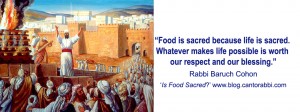IS FOOD SACRED? – Tzav – Lev. 6-8 — by Rabbi Baruch Cohon
Part of the detailed description we will read this week of the inauguration of Aaron and his sons as priests is the provision that they will eat sections of the same sacrifice they offer on the altar. Toward the end of our Torah portion, Moses tells Aaron and his sons to “cook the meat at the entrance of the Tent of Meeting, and eat it there, together with the bread that is in the basket of inauguration offerings.”
The same meal – the same meat and the same bread – that constituted an offering to G-d, also fed the human beings who brought the offering. Commenting on this provision, the Lubavitcher Rebbe writes:
One of the unique qualities of a Jew is that he can elevate the process of eating food – a mundane act which even animals perform – to be an act of serving G-d.
We don’t burn sacrifices on an altar today; we don’t symbolize our spirits rising to heaven with the smoke. But we can serve G-d with a simple blessing before and after we eat. Sustaining our bodies becomes a sacred process, since it can also sustain our spirits.
People in other faiths adopted the Jewish practice of reciting a prayer of thanks for a meal. In effect, this week’s Torah reading is a source of that practice. Certainly anyone who ever experienced desperate hunger will tell you that at such a time food is sacred.
Food is sacred because life is sacred. Whatever makes life possible is worth our respect and our blessing. Just as Aaron blessed the Almighty by sending heavenward the smoke of the offering he burned on the altar, he also served his Creator by sustaining his own created life. For Aaron’s descendants, physical and spiritual, that sustenance at least partially retained a sacred quality.
For many a Jewish mother and grandmother, special food carried a special importance, as illustrated by the old quip “do we eat to live or do we live to eat?” But the humor can be as delicious as the kugel.
A childhood memory that still makes me smile is the day my mother took me to the zoo to see the trained gorilla, Susie, that was the Zoo’s main attraction. Her trainer had a table set in the cage, tablecloth and all, and proudly brought Susie in to sit on a chair and eat lunch. He handed her a roll, which she took a bite of. He then gave her a spoon and a fork and she picked up her potato and put in her mouth like a human being, to the applause of the visitors. At which point I turned to my mother and said “No Hamotzi!” At that age, my conditioning led me to expect Susie to say a brocha before she ate.
Not for gorillas, I learned, but for humans. Truly the haMotzi and the Birkas haMazon are daily witnesses that we do not take our food for granted. Our lives, sustained by food, are sacred. Acknowledge it.




thank you for such a great post I like it